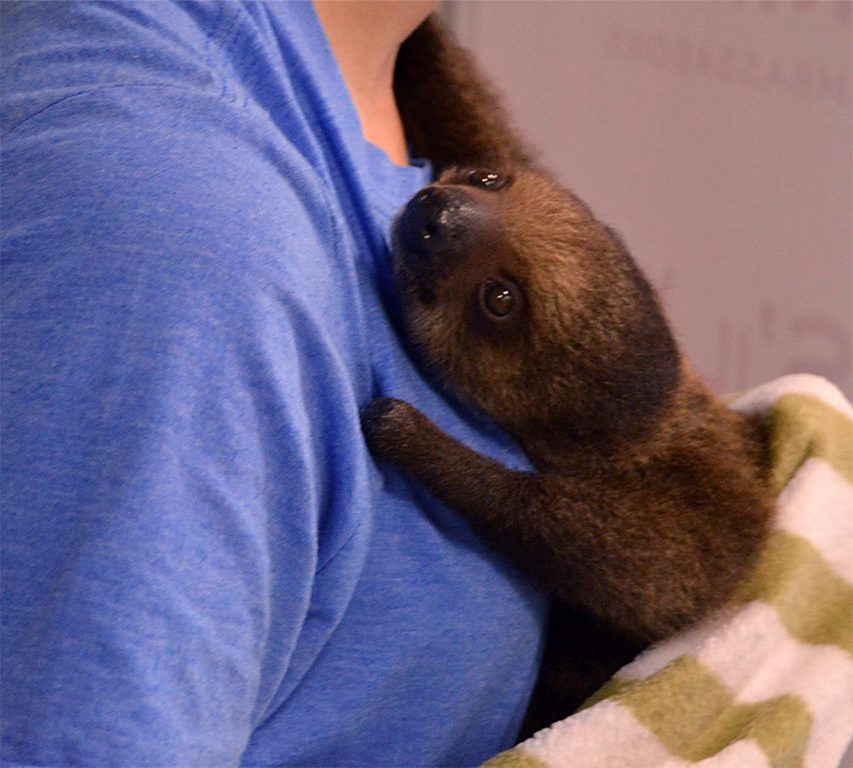Baby sloth visits Tecumseh Mall

Chloe, a six month old baby two-toed sloth clings to Cat Rancourt, her surrogate mother. Rancourt, a wildlife bioligist from Animal Ambassadors, a division of Little Ray’s Reptile Zoo nature centre, educates children and their parents about sloths during the March Break at Tecumseh Mall in Windsor, Ont. (Photo by Kenneth Pastushyn).
By Kenneth Pastushyn
A six-month-old two-toed baby sloth made a special appearance at Windsor’s Tecumseh Mall in March.
Chloe the sloth was there as part of Little Ray’s Reptile Zoo’s live animal exhibit for children and their parents to learn about the difficulties of exotic animal pet care.
“A very adorable creature, but sloths are not good pets” said Cat Rancourt, wildlife biologist for Little Ray’s. She acts as a surrogate mother for Chloe and is the only person allowed to handle her.
Since the release of the Disney movie Zootopia in 2016, sloths have become very popular. In the movie, Flash, the so-called fastest sloth working at the DMV run entirely by sloths, is a three-toed sloth with colour around the eyes and a mop-top haircut. Even slower than a two-toed sloth who sleeps 16 hours a day, Flash sleeps for 18 hours.
“In my opinion, the two-toeds are cuter because they have a larger snout and look like a teddy bear,” said Tyler Maybee, animal handler and educator for Little Ray’s.
According to Rancourt, after the release of since Zootopia, sloths have become the second-largest trafficked animal next to the pangolin, an armadillo-like mammal found in East Asia. Sloths come from the jungles of South America.
Chloe’s parents were taken out of the wild and illegally brought to the United States, destined to be sold in pet stores. The smugglers were immediately arrested and her parents were taken to a veterinarian, eventually ending up in an accredited zoo, according to Rancourt.
Chloe was born in captivity, so she will never breed again or be released in her natural environment because she does not have the instinct for survival to teach her children.
Chloe spent a lot of time in pet reserves such as Little Ray’s, which have a special mission to educate people.
“We get a lot of animals from rescues,” said Mike Lyon, the animal care manager at Little Ray’s in Ottawa. “The majority of the animals we get are unwanted pets.”
Lyon said when looking to purchase a pet, people should consider the size, life expectancy and dangers associated with the animal.
Sloths are slow-moving and lay around for weeks in the same spot.
“All they do is sleep and have no sense of hygiene – like some college students,” said Rancourt.
Sloths are too lazy to even take a bath. Everything is done slowly, even defecating. Chloe has a bowel movement only once every few weeks – and when she does, she loses a third of her body weight.
Taking care of sloths is hard work. Chloe has a heater and humidifier in her bedroom and staff who will wake up in the middle of the night to feed her. In captivity, Chloe eats long-grain wild rice, sweet potatoes and high-protein dog food.
After the presentation, everyone was encouraged to get a closer look at Chloe, who was wrapped in a warm blanket and hanging on to Rancourt’s shoulders. They were able to ask questions and snap a photo but were not allowed to touch Chloe.
“Sloths are delicate,” said Maybee. “A little bit of salmonella on a child’s fingertips can end her life.”
Rancourt likes to think of Chloe as her “second baby.” Lola, a baby kangaroo is her “first.” She is very protective and said she loves them both equally.
“If you love sloths, the best thing you can do is leave them alone,” said Rancourt.


